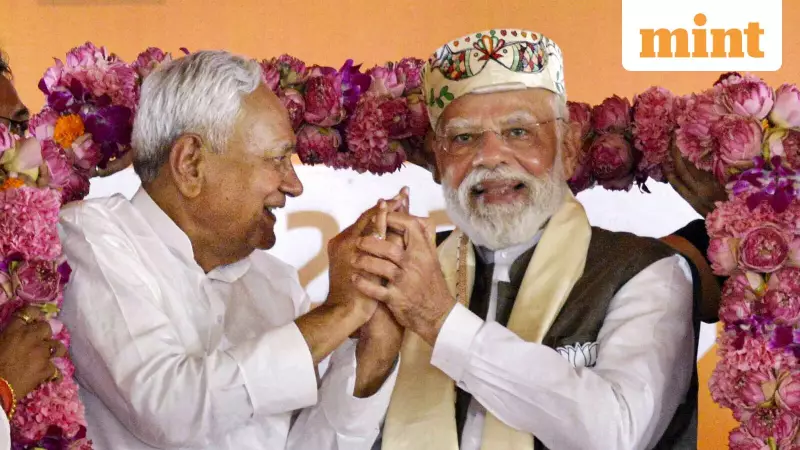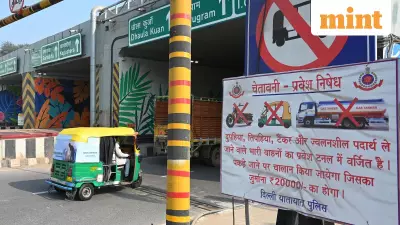
Prime Minister Narendra Modi has dramatically reshaped India's political discourse with two powerful new phrases following the National Democratic Alliance's emphatic victory in the Bihar assembly elections. In his first address after the electoral triumph, Modi introduced what he called the "MY formula" targeting women and youth, while branding the Congress as "MMC" - Muslim League Maoist Congress.
The New Political Vocabulary Emerges
Speaking with both gratitude and strategic attack lines, Prime Minister Modi acknowledged the massive mandate from Bihar's voters. "On behalf of the entire NDA family, I thank all the people of Bihar and accept this victory in all humility," he stated. The Prime Minister significantly recalled beginning his campaign from the village of socialist icon Kapurri Thakur, emphasizing that "this victory is proof that Bihar is going to be on the road to development."
In a strategic pivot from traditional caste-based political frameworks, Modi declared that some parties still relied on what he termed the "old MY formula," while asserting that a new electoral equation had now emerged in Indian politics. "The new MY formula is Mahila and Youth," he announced, directly addressing the demographic groups that powered the NDA's exceptional performance across Bihar.
MMC: The New Congress Definition
Modi sharpened his political offensive against the principal opposition party by coining another significant acronym: "MMC." "Today, the Congress has become MMC – Muslim League Maoist Congress and the entire agenda of the Congress now revolves around this," the Prime Minister asserted during his address.
The Prime Minister further predicted significant internal turmoil within the Congress party, suggesting that "within the Congress as well, a separate faction is emerging that is uncomfortable with this negative politics. I think that there could be another major split in the Congress." Without directly naming Rahul Gandhi, Modi criticized the "naamdaar" for driving the party "on a path of destruction" and indicated that widespread internal dissatisfaction was mounting within Congress ranks.
Opposition Reacts to Women's Voting Pattern
As INDIA bloc partners struggled to comprehend the scale of their defeat, VIP chief Mukesh Sahani directly attributed his party's comprehensive rout to the NDA's overwhelming appeal among women voters. The VIP, which had been projected as a key alliance partner with Sahani touted as a deputy chief minister candidate, failed to lead in any of the 12 seats it contested.
Sahani emphasized that the electoral outcome reflected "the people's mandate," stating clearly that "Voters did not connect with our message. They trusted Nitish ji and Modi ji, and I congratulate both of them." He identified the crucial differentiating factor as the NDA's targeted financial outreach to women through schemes like the Mukhyamantri Mahila Rojgar Yojana.
The first instalment of ₹10,000 has already reached more than 1.21 crore women under this program, creating substantial electoral impact. Sahani explained that "Our mothers and sisters who live in poverty felt that the money would change their lives. Naturally, they voted for that promise." He notably observed that politics had fundamentally shifted from "black money distributed at midnight by strongmen" to "state money distributed in broad daylight."
Bihar's Political Map Redrawn
The electoral results have dramatically reconfigured Bihar's political landscape, with the NDA surging toward nearly 200 of Bihar's 243 assembly seats. The Bharatiya Janata Party particularly demonstrated remarkable efficiency, achieving nearly a 95% strike rate in the constituencies it contested, firmly establishing the ruling alliance's control over the state's political trajectory.
Meanwhile, the Mahagathbandhan comprising the Rashtriya Janata Dal, Congress and Left parties struggled to cross even 35 seats, raising urgent and fundamental questions about the Opposition's coherence, messaging, and future viability. The comprehensive nature of the NDA's victory and the strategic introduction of new political terminology by Prime Minister Modi suggests significant implications for India's political narrative beyond Bihar, potentially setting the tone for upcoming electoral battles across the country.





